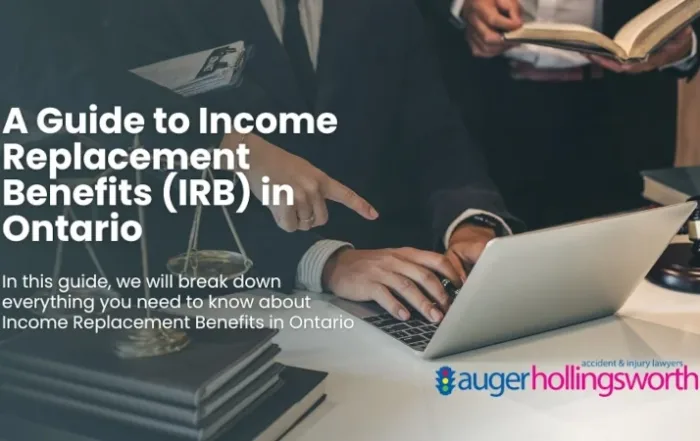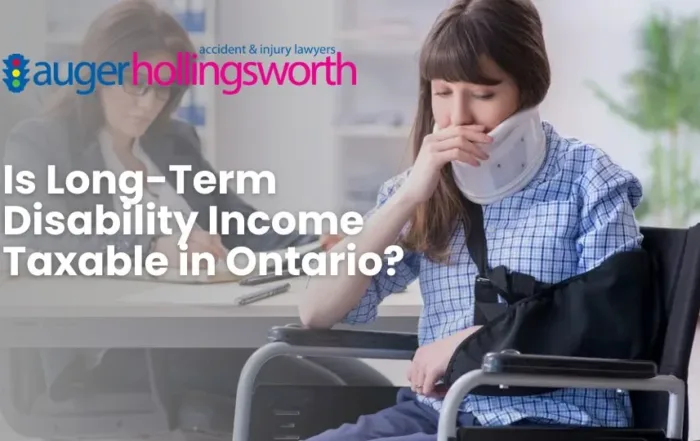Get a Fair Settlement from your Ontario Motor Vehicle Accident
1. Get appropriate medical care promptly following the auto accident: Call 9-1-1. Let trained medical professionals evaluate your injuries and take you to the hospital if needed.
2. Tell the truth but only the truth: Many accident victims speculate about the extent of their injuries or the cause of the accident at a time when they are upset and may lack information. Anything you say to the police, even if it is only conjecture on your part, may show up in a police report. Limit your statement to the facts you know. Ask the attending police officer for his or her badge number.
3. Get as much information as you can about any other vehicles involved in the car accident: Get the driver’s name; the car owner’s name; the make, model, year, color, and condition of the vehicle; the vehicle’s license plate number; the driver’s and owner’s addresses; and the name of the driver’s and owner’s insurance companies. Much of this information is usually on the police report. Get a copy of the police report and keep it in a safe place.
4. Make notes about the accident: either at the scene or as soon as you can after leaving. Write down (a) the approximate address or cross street; (b) the direction the cars were traveling; (c) the direction any vehicle was turning; (d) the position the vehicles were stopped following the collision; (e) the weather conditions, including whether the roads were clear; (f) the time of day and the position of the sun; (g) the road conditions (unusual potholes, debris); (h) any traffic signals or signs including speed limit postings; (i) the identification of any witnesses including names, addresses, and telephone numbers. A photo is worth a 1000 words. Remember, many of us now have telephone cameras and can capture the scene that way.
5. Find out where any of the vehicles in the accident were towed: in case you need to find out more about the damage to any of the vehicles involved.
Not everyone is going to be able to take steps 1 to 5 at the time of an accident. If you can manage, great! If not, your personal injury lawyer can help you collect the information you need.
6. Get prompt medical treatment: Even if you do not go to the hospital immediately after the accident, go to your family physician as soon as possible. Tell your doctor about all of your medical problems. Ask your doctor to record them. If your symptoms persist after the initial visit, return to your doctor and request referrals to specialists who can help you with your recovery.
7. Let your insurance company know you had an accident: Request accident benefit forms. Make sure you meet the deadline to complete the forms. (You should consider meeting with a lawyer before giving a sworn statement to any insurance company or adjuster.)
8. Identify personal property lost due to the accident: Broken glasses and watches or cut away shoes may be replaceable through your accident benefits.
9. Go to your medical appointments: always tell your doctors about all of your areas of pain. You should never exaggerate your symptoms, but you should also not minimize your ailments when talking with your doctors. This is not a time to be stoic. Make sure you tell your doctor about each and every symptom, including emotional concerns, fears, and anxieties. This is important to your treatment. If you see any other doctors or therapists, make sure that you tell both your current doctor and your lawyer immediately.
10. Do not talk about the accident: except to your doctor or lawyer. You should always know who is talking with you. In Ontario when you are in a motor accident, you will deal with at least two insurance companies: yours and the other driver’s. If there are more drivers, there will be more insurers…. Be careful about speaking with the insurance companies and their adjusters or lawyers without notifying your lawyer so that he/she may be present if necessary.
11. Do share your legal advice: If you are considering filing a lawsuit as a result of the accident, remember that your doctor’s records will likely become part of the record on the lawsuit. While your lawyer and doctor are on the same team (YOURS!), you should generally not repeat to your doctor what your lawyer tells you about the law suit in case it is recorded in the doctor’s notes and is then disclosed to the insurance company’s lawyer.
12. You need a complete investigation: It is extremely important that you or your lawyer collect all witness statements, police reports, medical reports and anything else related to your accident. Your case may require hiring private investigators or accident reconstruction experts. The other party’s insurance company will collect all sorts of information that may be used against you. You could be at a serious disadvantage if you do not conduct a thorough investigation soon after the accident.
13. Take photographs of all important elements in your case as soon as possible – and record the date the photos were taken: For example, if you are in a car accident, you should take photographs of your car and the car that hit you, the accident scene, and your injuries. If you are bruised, make sure the lighting is adequate and that the bruising is apparent in the pictures. Photos are vivid evidence of what you experienced. Sometimes, a picture is worth a thousand words, and juries find photos to be powerful proof of your injuries. If you have taken pictures, tell your lawyer and provide him with the photographs or negatives. If an investigator is necessary, we have several who work with us to conduct all aspects of the investigation.
14. Don’t fix your car until you have taken photos of your vehicle’s damage: You don’t want to rely on photographs taken by the other party’s investigator. These people are trained to minimize the damage appearance in the photos. Take your own photos or tell us and we will obtain photos that properly show your damages.
15. Don’t sign a release to any insurance company: Many accident victims make the mistake of signing a release for one or more insurance companies before meeting with a lawyer. This may give the insurance companies uncontrolled access to your medical records. A lawyer can help you respond to requests for this sensitive information in a way that meets your legal obligations, without hurting your case.
16. Don’t plead guilty to any traffic offence before you consult with your lawyer: If you are charged as a result of the accident, even if it is only a Highway Traffic Act ticket, ask your lawyer to evaluate your ticket or charge before the time and date set for the hearing. In the context of an accident, pleading guilty to a traffic offence and paying a ticket may have bigger implications than simply a few demerit points on your driving record.
17. Don’t underestimate the insurance adjusters: Insurance company adjusters are trained to gather information that may be damaging to your case, and to settle cases for the lowest amount possible.
18. Know all your damages: In Ontario, some of your damages will normally be paid by your own insurance company. They include the cost of:
- medical treatment that is not covered by OHIP;
- an income replacement if you cannot work due to your injuries;
- having someone look after you;
- having someone perform housekeeping tasks you can’t do while you are injured;
- psychological counseling caused by stress or some other aspect of the accident and possibly other money you paid out or lost as a result of your injury.
Extra damages may be payable by the other party’s insurance company. Most importantly, if you have a serious and permanent injury, you may qualify for damages for your pain and suffering. In some of these cases, your immediate family members may have claims too, because they have lost your care and company while you are injured.
19. Record of all expenses and hours or days lost from work due to your injuries: Your lawyer will get written documentation from your employer to verify the lost earnings. If your injuries are preventing you from returning to work or school, ask your doctor for a note confirming that you cannot attend.
20. Track of the time spent by friends and family to look after you and to take over your household and family obligations.
21. Organize all bills and receipts related to your accident: If you don’t save your bills and receipts, you may not be able to prove the amount of your damages. If you cannot prove the amount, you cannot recover for these expenses. Be sure to save everything: hospital charges, pharmacy bills, therapy bills, and all other bills you incurred because of your accident. If you buy over-the-counter pain medicine, heating pads, crutches, clothing to go over casts or braces, or similar items, you may be able to recover these expenses. Make sure you get a receipt for every bill you pay.
22. Know all your injuries: Many victims feel that if they don’t hurt, they aren’t injured. Yet injuries caused by accidents may not develop into symptoms for days — even weeks. Don’t be too quick to rule out injuries just because they haven’t yet appeared. This is why, at least early in your claim, you should not discuss your injuries or possible lack of symptoms with insurance company adjusters. (See secrets #6 and #8.)
23. Know the emotional toll of an accident: If you are having flashbacks, nightmares, anxiety, fear or sleep disturbance, you might benefit from a psychological assessment. Ask your family doctor for a referral if you need help in these areas. If your doctor or family members suggest this type of treatment, take them up on it.
24. Keep a journal of your accident-related experiences: Record sleepless nights, pain relief needs, and limitations on your regular activities. Make a note of special events, hobbies, or outings that you missed because of the accident.
25. What insurance do you have? In many cases, an injured victim can legally collect from two or three different insurance policies at the same time. Yet many accident victims don’t know where to look for various insurance coverages. Your lawyer will help you determine whether you can collect from more than one policy.
We know some of these steps can be tough if you are injured… A personal injury lawyer can relieve you of most of the burden by assuming responsibility for many of these tasks.
26. Don’t ditch your doctor: Many people stop going to their doctor when they feel better before the doctor releases them from treatment. Make sure you continue going to the doctor until your doctor releases you! Your doctor knows the complications that could result from your injury. The type of injury may be complex and the mere fact that you are no longer in pain does not mean that your injuries have fully healed. If you are referred to treatment with a therapist who is not covered by OHIP, your own insurance company may pay for the service. Your lawyer can help you access these benefits.
27. File a lawsuit if the settlement offer is not fair: After your doctor releases you from treatment, prepare your case quickly and, if necessary, file your lawsuit. Insurance companies usually get serious about settling your claim if they see that they will have to start paying lawyers to defend your lawsuit. We will be more than happy to discuss the benefits and risks of filing a lawsuit and will make sure you understand all of the aspects before deciding to take this important step.
28. Get a qualified, experienced personal injury trial lawyer to evaluate your case: You probably had a doctor evaluate your injuries. Doesn’t it also make sense to have a lawyer evaluate your legal claim? An experienced personal injury trial lawyer can help you by reviewing your file. He/she will carefully review the police report, doctors’ statements, therapy bills, time lost from work, and other information. Then, he/she can give you an informed opinion about the estimated value of your case. If you’d like us to evaluate your case, please don’t hesitate to call.
29. Hire a lawyer, choose one who isn’t afraid to go to court: Insurance companies and their lawyers keep tabs on plaintiff side lawyers. They know which lawyers will take them to court — the fighters. And they know which lawyers will not go to court – the settlers. The fighters usually get more money for their clients than the settlers. Make sure you discuss your case with a skilled personal injury trial lawyer.
If you would like to consult with the personal injury lawyers at Auger Hollingsworth, call 613 233-4529 and email info@ottawalawfirm.ca.














